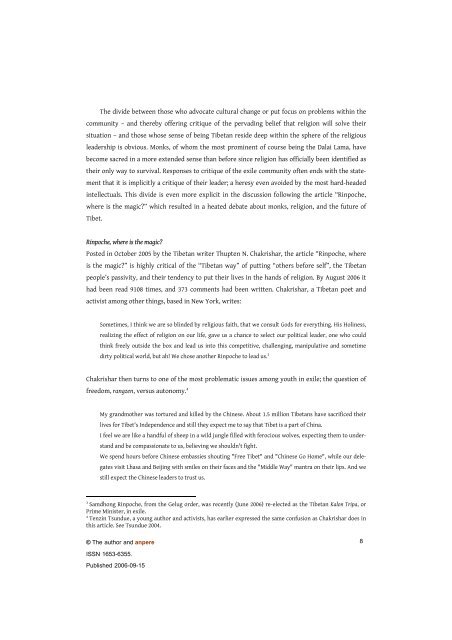Being Tibetan: Internet and Public Identity among ... - anpere.net
Being Tibetan: Internet and Public Identity among ... - anpere.net
Being Tibetan: Internet and Public Identity among ... - anpere.net
Create successful ePaper yourself
Turn your PDF publications into a flip-book with our unique Google optimized e-Paper software.
The divide between those who advocate cultural change or put focus on problems within the<br />
community – <strong>and</strong> thereby offering critique of the pervading belief that religion will solve their<br />
situation – <strong>and</strong> those whose sense of being <strong>Tibetan</strong> reside deep within the sphere of the religious<br />
leadership is obvious. Monks, of whom the most prominent of course being the Dalai Lama, have<br />
become sacred in a more extended sense than before since religion has officially been identified as<br />
their only way to survival. Responses to critique of the exile community often ends with the statement<br />
that it is implicitly a critique of their leader; a heresy even avoided by the most hard-headed<br />
intellectuals. This divide is even more explicit in the discussion following the article “Rinpoche,<br />
where is the magic?” which resulted in a heated debate about monks, religion, <strong>and</strong> the future of<br />
Tibet.<br />
Rinpoche, where is the magic?<br />
Posted in October 2005 by the <strong>Tibetan</strong> writer Thupten N. Chakrishar, the article “Rinpoche, where<br />
is the magic?” is highly critical of the “<strong>Tibetan</strong> way” of putting “others before self”, the <strong>Tibetan</strong><br />
people’s passivity, <strong>and</strong> their tendency to put their lives in the h<strong>and</strong>s of religion. By August 2006 it<br />
had been read 9108 times, <strong>and</strong> 373 comments had been written. Chakrishar, a <strong>Tibetan</strong> poet <strong>and</strong><br />
activist <strong>among</strong> other things, based in New York, writes:<br />
Sometimes, I think we are so blinded by religious faith, that we consult Gods for everything. His Holiness,<br />
realizing the effect of religion on our life, gave us a chance to select our political leader, one who could<br />
think freely outside the box <strong>and</strong> lead us into this competitive, challenging, manipulative <strong>and</strong> sometime<br />
dirty political world, but ah! We chose another Rinpoche to lead us. 3<br />
Chakrishar then turns to one of the most problematic issues <strong>among</strong> youth in exile; the question of<br />
freedom, rangzen, versus autonomy. 4<br />
My gr<strong>and</strong>mother was tortured <strong>and</strong> killed by the Chinese. About 1.5 million <strong>Tibetan</strong>s have sacrificed their<br />
lives for Tibet's Independence <strong>and</strong> still they expect me to say that Tibet is a part of China.<br />
I feel we are like a h<strong>and</strong>ful of sheep in a wild jungle filled with ferocious wolves, expecting them to underst<strong>and</strong><br />
<strong>and</strong> be compassionate to us, believing we shouldn't fight.<br />
We spend hours before Chinese embassies shouting "Free Tibet" <strong>and</strong> "Chinese Go Home", while our delegates<br />
visit Lhasa <strong>and</strong> Beijing with smiles on their faces <strong>and</strong> the "Middle Way" mantra on their lips. And we<br />
still expect the Chinese leaders to trust us.<br />
3 Samdhong Rinpoche, from the Gelug order, was recently (June 2006) re-elected as the <strong>Tibetan</strong> Kalon Tripa, or<br />
Prime Minister, in exile.<br />
4 Tenzin Tsundue, a young author <strong>and</strong> activists, has earlier expressed the same confusion as Chakrishar does in<br />
this article. See Tsundue 2004.<br />
© The author <strong>and</strong> <strong>anpere</strong><br />
ISSN 1653-6355.<br />
Published 2006-09-15<br />
8







